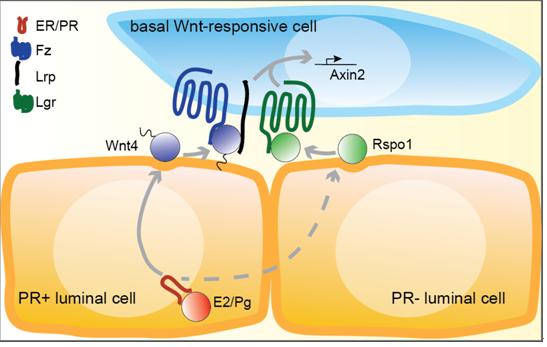
Researchers Identify R-spondin1 as Novel Hormone Mediator for Mammary Stem Cell Self-renewal
Sep 29, 2014 Email"> PrintText Size

Signals from the niche play pivotal roles in regulating adult stem cell self-renewal. Mammary gland development is governed by the concerted action of hormones. Steroid hormones can expand mammary stem cells (MaSCs) in vivo, yet the facilitating local niche factors that directly contribute to the MaSC expansion remain unclear.
A research team led by Prof. ZENG Yi of Shanghai Institute of Biochemistry and Cell Biology (SIBCB), Shanghai Institutes for Biological Sciences of Chinese Academy of Sciences (CAS), identified R-spondin1 (Rspo1) as a novel hormonal mediator in the mammary gland.
Hormones control the synchronized expression of Rspo1 and Wnt4 in distinct types of luminal cells, and thereby regulate self-renewal of MaSC. This unveils the intriguing concept that hormones induce a collaborative local niche environment for stem cells. Differentiated mammary luminal cells are descendants of the MaSC. Thus, in the mammary gland, the critical self-renewal niche signaling events take place between the stem cells and their own progeny cells.
The authors established a novel method by engaging steroid hormones to expend MaSCs in culture. This is a novel approach recapitulating the in vivo physiological situations in vitro. The easy accessibility of E2 and Pg will allow the MaSC expanding method to be widely implemented, e.g. for hormone-dependent and stem cell-targeted drug screening.
This work entitled “R-spondin1 Is A Novel Hormone Mediator for Mammary Stem Cell Self-renewal” was published online in Genes & Development on September 26, 2014.
This work is supported by grants from the Chinese Academy of Sciences, National Natural Science Foundation of China, the Ministry of Science and Technology of China and Shanghai Municipal Science and Technology Commission.

Figure: Model of the differentiated luminal cells synergistically regulating the self-renewal of MaSCs. Hormone stimulates the expression of Wnt4 in PR+luminal cells and Rspo1 in PR_ luminal cells. Rspo1 and Wnt4 collaborate to induce basal cell Wnt response, enabling MaSC property maintenance or their expansion in number (Image by Prof. ZENG Yi`s group)
Signals from the niche play pivotal roles in regulating adult stem cell self-renewal. Mammary gland development is governed by the concerted action of hormones. Steroid hormones can expand mammary stem cells (MaSCs) in vivo, yet the facilitating local niche factors that directly contribute to the MaSC expansion remain unclear.
A research team led by Prof. ZENG Yi of Shanghai Institute of Biochemistry and Cell Biology (SIBCB), Shanghai Institutes for Biological Sciences of Chinese Academy of Sciences (CAS), identified R-spondin1 (Rspo1) as a novel hormonal mediator in the mammary gland.
Hormones control the synchronized expression of Rspo1 and Wnt4 in distinct types of luminal cells, and thereby regulate self-renewal of MaSC. This unveils the intriguing concept that hormones induce a collaborative local niche environment for stem cells. Differentiated mammary luminal cells are descendants of the MaSC. Thus, in the mammary gland, the critical self-renewal niche signaling events take place between the stem cells and their own progeny cells.
The authors established a novel method by engaging steroid hormones to expend MaSCs in culture. This is a novel approach recapitulating the in vivo physiological situations in vitro. The easy accessibility of E2 and Pg will allow the MaSC expanding method to be widely implemented, e.g. for hormone-dependent and stem cell-targeted drug screening.
This work entitled “R-spondin1 Is A Novel Hormone Mediator for Mammary Stem Cell Self-renewal” was published online in Genes & Development on September 26, 2014.
This work is supported by grants from the Chinese Academy of Sciences, National Natural Science Foundation of China, the Ministry of Science and Technology of China and Shanghai Municipal Science and Technology Commission.

Figure: Model of the differentiated luminal cells synergistically regulating the self-renewal of MaSCs. Hormone stimulates the expression of Wnt4 in PR+luminal cells and Rspo1 in PR_ luminal cells. Rspo1 and Wnt4 collaborate to induce basal cell Wnt response, enabling MaSC property maintenance or their expansion in number (Image by Prof. ZENG Yi`s group)
CAS Institutes
There are 124 Institutions directly under the CAS by the end of 2012, with 104 research institutes, five universities & supporting organizations, 12 management organizations that consist of the headquarters and branches, and three other units. Moreover, there are 25 legal entities affiliated and 22 CAS invested holding enterprisesThere are 124 I...>> more
Contact Us

Chinese Academy of Sciences
Add: 52 Sanlihe Rd., Xicheng District, Beijing, China
Postcode: 100864
Tel: 86-10-68597592 (day) 86-10-68597289 (night)
Fax: 86-10-68511095 (day) 86-10-68512458 (night)
E-mail: cas_en@cas.cn

